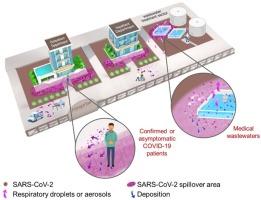SARS-CoV-2 spillover into hospital outdoor environments
Abstract
Facing the ongoing coronavirus infectious disease-2019 (COVID-19) pandemic, many studies focus on severe acute respiratory syndrome coronavirus 2 (SARS-CoV-2) in indoor environment, on solid surface or in wastewater. It remains unclear whether SARS-CoV-2 can spill over into outdoor environments and impose transmission risks to surrounding people and communities. In this study, we investigated the presence of SARS-CoV-2 by measuring viral RNA in 118 samples from outdoor environment of three hospitals in Wuhan. We detected SARS-CoV-2 in soils (205–550 copies/g), aerosols (285−1,130 copies/m3) and wastewaters (255−18,744 copies/L) in locations close to hospital departments receiving COVID-19 patients or in wastewater treatment sectors. These findings revealed a significant viral spillover in hospital outdoor environments that was possibly caused by respiratory droplets from patients or aerosolized particles from wastewater containing SARS-CoV-2. In contrast, SARS-CoV-2 was not detected in other areas or on surfaces with regular implemented disinfection. Soils may behave as viral warehouse through deposition and serve as a secondary source spreading SARS-CoV-2 for a prolonged time. For the first time, our findings demonstrate that there are high-risk areas out of expectation in hospital outdoor environments to spread SARS-CoV-2, calling for sealing of wastewater treatment unit and complete sanitation to prevent COVID-19 transmission risks.


 求助内容:
求助内容: 应助结果提醒方式:
应助结果提醒方式:


